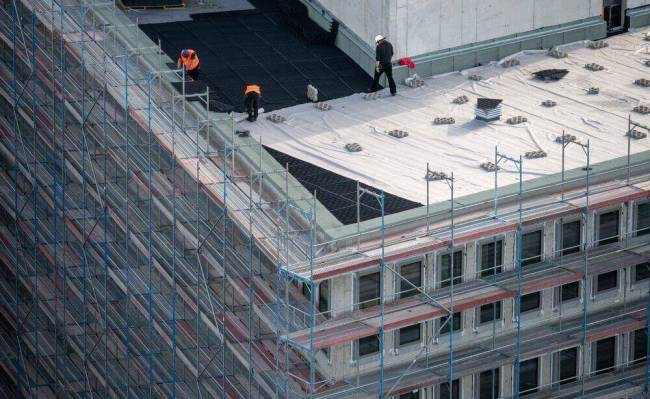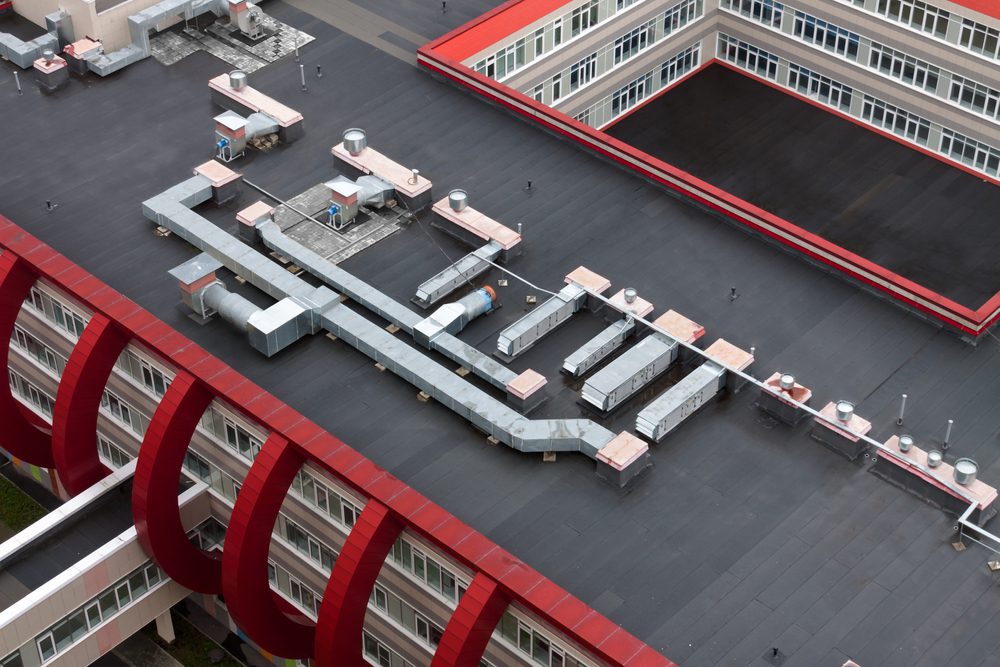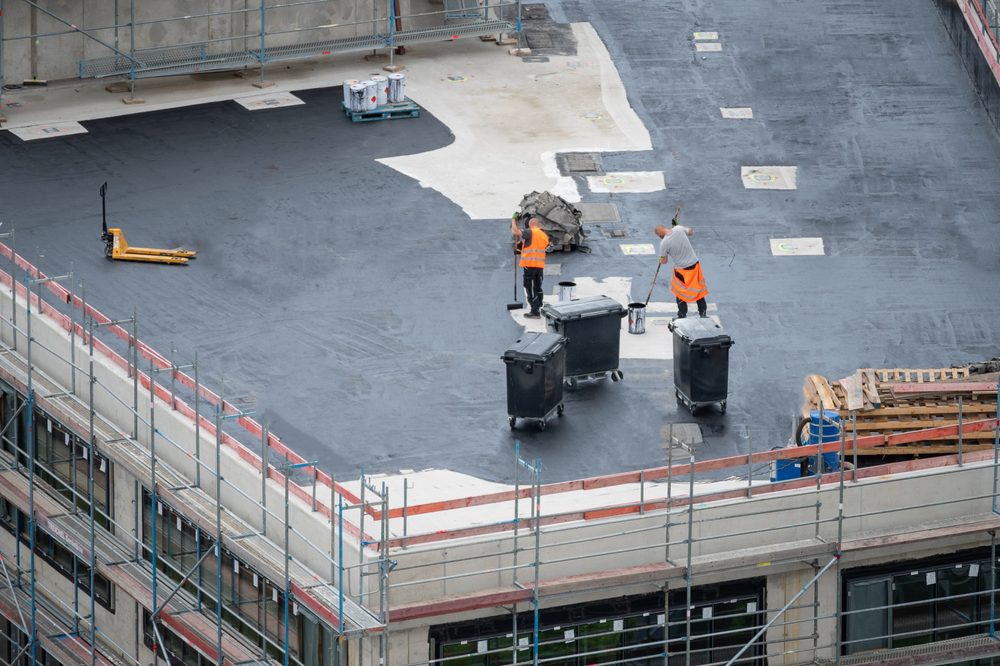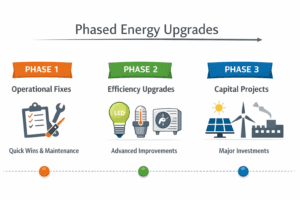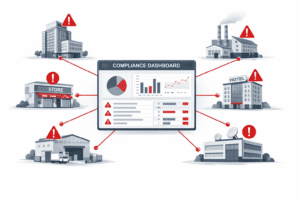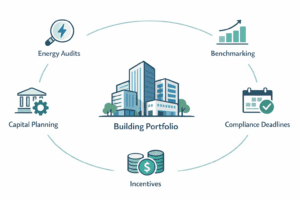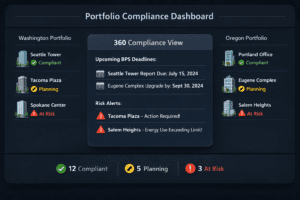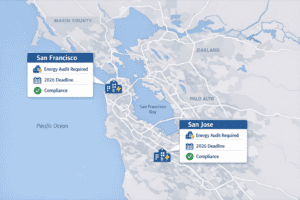When it comes to commercial buildings, the roof is often an unsung hero. It shields businesses from the elements, ensuring that operations run smoothly, and customers remain comfortable. However, like any part of a building, commercial roofs have a finite lifespan and eventually need replacement. Understanding the cost factors associated with commercial flat roof replacement is crucial for business owners and facility managers. In this blog, we’ll delve into these factors to help you make informed decisions about your commercial roofing needs.
The Significance of Commercial Roofing
A. Role of the Roof in Commercial Buildings
The role of a commercial roof extends beyond mere protection from rain and sunshine. It also contributes to the overall structural integrity of the building. A well-maintained roof ensures the safety of occupants and protects valuable assets and inventory. Furthermore, the appearance of your roof can influence a customer’s perception of your business.
B. Impact of a Well-Maintained Roof on Businesses
A well-maintained roof can lead to significant cost savings in the long run. It enhances energy efficiency, reducing heating and cooling costs. Additionally, a roof in good condition minimizes the risk of costly interior damage caused by leaks.
C. Why Flat Roofs Are Common in Commercial Structures
Flat roofs are a popular choice for commercial buildings due to their cost-effectiveness and ease of installation. They provide ample space for HVAC equipment and are suitable for rooftop gardens and solar panel installations.
Key Factors Affecting Commercial Flat Roof Replacement Costs
A. Roofing Material Choices
The choice of roofing material plays a pivotal role in replacement costs. Here are some common materials used in commercial roofing:
– Single-Ply Membranes: Affordable and lightweight, these membranes are easy to install. However, they may require more frequent maintenance.
– Modified Bitumen: Known for durability and flexibility, modified bitumen roofs are slightly more expensive but offer excellent weather resistance.
– Built-Up Roofing (BUR): BUR systems consist of multiple layers of materials, providing superior insulation and protection. They tend to be costlier due to their complexity.
When selecting a material, consider factors such as climate, maintenance requirements, and the material’s expected lifespan.
B. Roof Size and Complexity
The size and complexity of your roof are major cost drivers. Larger roofs naturally require more materials and labor. Additionally, factors like rooftop equipment, skylights, and unusual architectural designs can increase complexity and costs. Be sure to account for these factors when budgeting for replacement.
C. Roofing System Components
The components of your roofing system are integral to its performance. Elements such as insulation, drainage systems, and ventilation play a crucial role in preventing moisture-related issues and maintaining energy efficiency. Upgrading or repairing these components can affect replacement costs but can also lead to long-term savings through improved performance.
D. Roofing Contractor Selection
Choosing the right contractor is paramount. While it may be tempting to opt for the lowest bid, it’s essential to consider the contractor’s reputation, experience, and credentials. A qualified contractor can ensure that the project is completed correctly, avoiding costly mistakes that could arise from subpar workmanship.
E. Maintenance and Repairs
Regular maintenance is an investment that can save you from costly repairs and premature replacement. Neglecting maintenance can lead to issues like leaks, insulation degradation, and structural damage. By addressing these issues promptly, you can extend the lifespan of your roof and minimize long-term costs.
The Cost-Benefit Analysis of Roof Replacement
A. Weighing the Costs Against Potential Savings
Replacing a commercial flat roof is undoubtedly a significant expense. However, it’s essential to view it as an investment. Consider the potential savings from improved energy efficiency, reduced maintenance and repair costs, and the protection of your assets. Over time, these benefits can outweigh the initial replacement expense.
B. Energy Efficiency and Its Impact on Long-term Costs
Energy-efficient roofing materials and insulation can lead to substantial savings on heating and cooling costs. Some roofing systems are designed to reflect sunlight, reducing the heat absorbed by the building. This not only creates a more comfortable interior but also lowers energy bills.
C. Financial Incentives and Tax Benefits for Roofing Upgrades
Government incentives and tax benefits are often available for energy-efficient roofing upgrades. These incentives can offset a significant portion of your replacement costs, making it a more financially viable option.
The Importance of Timely Roof Replacement
A. The Consequences of Delaying Roof Replacement
Delaying roof replacement can have severe consequences. Leaks and water damage can compromise the structural integrity of the building, leading to more extensive and costly repairs. Furthermore, an old and deteriorating roof can negatively impact your business’s image and even drive away potential customers.
B. Signs That Indicate the Need for Immediate Replacement
Keep an eye out for signs that your roof needs replacement, including visible damage, leaks, and excessive wear and tear. Regular inspections by a professional can help identify issues before they become major problems.
B. Preventing Emergency Replacements Through Proactive Maintenance
Proactive maintenance can help you avoid the need for emergency roof replacements. By addressing issues as they arise and conducting regular inspections, you can extend the lifespan of your roof and reduce the likelihood of sudden, costly failures.
Budgeting for Commercial Flat Roof Replacement
A. Steps to Creating an Accurate Budget
Creating a budget for roof replacement involves several steps:
– Evaluate the current state of your roof.
– Determine your desired roofing material and system.
– Obtain multiple quotes from reputable contractors.
– Factor in the costs of materials, labor, and any necessary upgrades.
– Include a contingency fund for unexpected expenses.
B. Allocating Funds for Unexpected Expenses
It’s crucial to allocate funds for unforeseen issues that may arise during the replacement process. Unexpected structural damage, additional repairs, or the need for insulation upgrades can all impact your budget.
C. Importance of Obtaining Multiple Quotes
Obtaining multiple quotes from different contractors is essential for budgeting accuracy. This allows you to compare costs, evaluate the quality of materials and workmanship, and make an informed decision based on your specific needs and budget constraints.
Sustainability and Environmental Considerations
A. Eco-friendly Roofing Materials and Practices
In today’s environmentally conscious world, there’s a growing emphasis on eco-friendly roofing solutions. Materials like cool roofs, green roofs, and solar panels not only benefit the environment but also offer potential energy savings and tax incentives.
B. Impact on the Environment and Corporate Responsibility
Choosing sustainable roofing options aligns with corporate responsibility and demonstrates your commitment to reducing your environmental footprint. It can also enhance your company’s image, attracting environmentally conscious customers.
C. Potential Savings Through Sustainable Roofing
While sustainable roofing options may have a higher upfront cost, they often yield long-term savings through reduced energy consumption and maintenance expenses. Consider the lifecycle cost of sustainable roofing materials when making your decision.
Conclusion
In the world of commercial roofing, knowledge is power. Understanding the cost factors of commercial flat roof replacement empowers business owners and facility managers to make informed decisions that protect their investments and ensure the longevity of their structures. By considering factors like roofing materials, roof size, contractor selection, maintenance, and sustainability, you can optimize your roofing investment for both short-term and long-term benefits. Remember, your roof is not just a cover over your business—it’s an integral part of your success.
Discover how VertPro.com can elevate your property’s energy efficiency to new heights. We are your ultimate destination for all things related to Commercial Energy Audits, Benchmark Compliance consultancy, and access to our state-of-the-art Construction Marketplace. As trailblazers in the industry, VertPro® empowers Building Owners and Property Managers across the nation with innovative SaaS technology-based solutions. From Energy Benchmarking to Energy Audits/RCx Plus, we’re dedicated to ensuring compliance with over 50 Energy Benchmarking and Energy Efficiency Laws.
Now is the time to seize the opportunity to maximize your property’s energy potential and value. Explore VertPro.com’s comprehensive solutions today and let us be the catalyst for the transformation your property deserves. Your energy-efficient future starts here!


